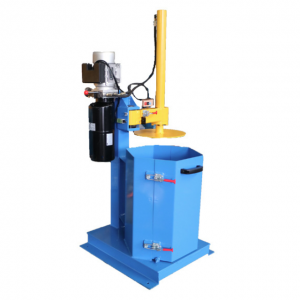In the shipping industry, effective waste management is crucial for maintaining safety, complying with environmental regulations, and ensuring operational efficiency. Traditionally, ship waste management relied on methods such as manual sorting, incineration, and landfilling. However, technological advancements have led to the emergence of ship-based marine garbage compactors as a revolutionary solution. This article will introduce waste management methods using ship-based marine garbage compactors, focusing on their advantages, operational efficiency, and environmental impact.
Understanding Traditional Waste Management Solutions
Traditional ship waste management solutions often require manual labor and rudimentary systems. Furthermore, waste must be collected at ports for onshore processing. Common methods include:
Manual sorting:
Workers manually separate recyclables from general waste. This process is time-consuming, labor-intensive, and often prone to human error.
Incineration:
Some ships use incinerators to burn waste. While this method can reduce waste volume, it generates harmful emissions and requires strict compliance with regulations.
Landfilling:
Waste is buried in dedicated landfills, but care must be taken to manage the greenhouse gases and leachate generated during the landfill process.
Unloading waste at ports:
Ships often rely on port facilities for waste disposal. This can be inconvenient, especially in remote areas with limited port services.
While these methods have become standard practice, they also present numerous challenges that can be addressed with modern solutions such as marine garbage compactors.
The Rise of Marine Garbage Compactors
Marine garbage compactors have become vital instruments for vessels, offering innovative waste disposal solutions.
1. Effective Waste Compression
A key benefit of marine garbage compactors is their capacity to compress various waste types efficiently. These machines employ hydraulic-driven oil cylinders to condense refuse into compact, manageable packages. This leads to a considerable decrease in waste volume, allowing vessels to accommodate more waste without the need for frequent disposal. Such efficiency is especially advantageous during extended voyages where opportunities for waste disposal may be scarce.
How It Works
Marine garbage compactors are capable of processing a variety of materials, such as unbound waste paper, cardboard boxes, plastic packaging bags, and household refuse. The hydraulic pump generates high compaction forces at low amperage, ensuring uniform waste compaction. By minimizing waste volume, vessels can maximize storage capacity, ultimately reducing costs related to waste transportation and disposal.
2. Streamlined Operations
Marine garbage compactors are engineered with user-friendly features that facilitate waste management tasks on board. The machines do not require waste bundling, enabling crew members to load garbage directly into the compactor without the inconvenience of securing bundles. This ease of use not only conserves time but also diminishes the risk of injuries linked to handling heavy or awkward waste.
Step-by-Step Procedure
Utilizing a marine garbage compactor follows a simple procedure:
Open the Positioning Pin: Ensure that hands and loose clothing are kept clear of the mechanism.
Insert Garbage: Position the garbage bag over the feed box and load the waste.
Start the Motor: After ensuring the area is clear, activate the motor.
Control the Compression: Pull the control valve to commence compression.
With clear operational instructions and safety measures, crew members can swiftly learn to operate the compactor, thereby enhancing overall efficiency on board.
3. Space Optimization
Space is frequently limited on vessels, making effective waste management crucial for sustaining a clean and functional environment. Marine garbage compactors assist in maximizing available space by considerably decreasing the volume of waste. This is especially vital on smaller vessels where storage options are restricted.
Storage Capacity
By compressing waste into more compact packages, these machines enable vessels to accommodate a greater amount of refuse in designated areas. This optimization allows crew members to dedicate less time to waste management and more time to their primary duties, thereby enhancing overall operational efficiency. Additionally, the capacity to store waste compactly lessens the frequency of disposal trips, reducing interruptions to the vessel’s schedule.
4. Enhanced Environmental Compliance
Environmental regulations within the maritime sector are rigorous, and vessels are required to comply with guidelines concerning waste disposal. Marine garbage compactors aid in achieving environmental compliance by decreasing the quantity of waste discharged at sea. By compacting refuse prior to disposal, vessels can significantly lessen their environmental impact.
Responsible Waste Management
Employing a marine garbage compactor is in line with best practices for responsible waste management. By minimizing waste volume, vessels can ensure adherence to regulations and safeguard marine ecosystems. This dedication to environmental responsibility not only improves the vessel’s reputation but also cultivates a culture of sustainability among the crew.
5. Cost-Effectiveness
Investing in a marine garbage compactor can result in significant long-term savings for vessel operators. By minimizing the volume of waste, vessels can lower their transportation and disposal expenses. Furthermore, the compactor’s efficiency allows crew members to handle waste more proficiently, thereby decreasing labor costs related to waste management.
Reduced Waste Disposal Frequency
With the capability to store a greater amount of compacted waste, vessels can prolong the time between waste disposal trips. This leads to reduced fuel expenses and less operational downtime, enabling the vessel to concentrate on its primary tasks. Over time, these savings can accumulate, making marine garbage compactors a financially prudent choice for ship operators.
Conclusion
Marine garbage compactors provide numerous advantages that improve waste management practices aboard vessels. From effective waste compression and streamlined operations to space optimization, adherence to environmental regulations, and cost-effectiveness, these machines are essential assets for maritime operations. By investing in a marine garbage compactor, vessel operators can enhance their waste management systems, support environmental sustainability, and ultimately boost the overall efficiency of their operations.
For further information regarding marine garbage compactors and to examine your options, please contact ChutuoMarine at marketing@chutuomarine.com. Emphasize effective waste management and protect the environment while ensuring your vessel operates at optimal efficiency.
Post time: Sep-10-2025








